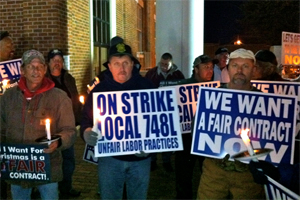Striking Mississippi Unionists Protest the Everyday Dictatorship of Corporate America

A dozen weary Steelworkers trekked from Mississippi to Ohio last week, hoping to insert a few uncomfortable questions into the clubby confines of their company’s shareholders meeting.
Approaching their tenth month on strike, the workers from Omnova Solutions wanted to ask the CEO just how the company had found enough money to grant the CEO a 90 percent pay increase—boosting his take-home to $3.5 million a year—while they were asked to forget about seniority and choke down benefit givebacks that amount to a 15 percent pay cut.
The strikers didn’t get the chance. Prepared for their arrival, the company, which makes vinyl-coated wall coverings used in hotels, denied access to most of the strikers, although they carried proxies from other shareholders.
Only a few who owned stock themselves were allowed into the hotel outside Cleveland where the meeting was held. Once inside, they found twitchy security guards and dividers in the hallways that blocked shareholders from reaching the suites where executives and the board of directors were gathered.
The strikers took seats and waited. Before long, the company directors trooped in together, took the stage, and reached agreement on three pieces of business. Then they marched back out.
The whole thing was over in 16 minutes, with little discussion and certainly no questions from the supposed “owners” of the company represented by the dozen or so shareholders filling the chairs.
“I couldn’t get away with running a union meeting like that,” said Jay Lawrence, president of USW Local 748L. The members would have his head.
Representatives from Omnova’s plants in Mogadore, Ohio (UFCW-represented); Calhoun, Georgia (Workers United-SEIU); and Jeanette, Pennsylvania (USW) all joined the striking Steelworkers in last week’s visit to the shareholders meeting.
The contingent was in the middle of the restive Midwest, where outraged unionists in Ohio and Wisconsin are fast collecting signatures to force votes that would chase out Republican lawmakers and their anti-union legislation.
But with no such recourse in the private sector, the strikers buckled up for the 850-mile drive back to their picket line in Columbus, Mississippi.
NOBODY CROSSES
Lawrence said the strike has been remarkably cohesive. After nearly 10 months, none of the 180 members in the right-to-work state has crossed the line. The strikers’ enormous experience helps, he said: the least senior member has 17 years in, and average seniority is almost 29.

SUPPORT LABOR NOTES
BECOME A MONTHLY DONOR
Give $10 a month or more and get our "Fight the Boss, Build the Union" T-shirt.
The job pays about $18 an hour, after a decade of concessionary contracts that ratcheted up health care costs. It’s a job you keep: Lawrence worked 25 years on third shift before a spot opened up on days.
That made the company’s demands to strip seniority all the more galling. Management wants to bump at will, change shifts on the fly, axe an incentive system, and combine and eliminate jobs—fouling up a system Lawrence says has operated smoothly for a generation.
“We can set up, color match, and run it off without supervisors or anyone,” he said. “We can make quick changeovers. All that comes when you have experience.”
Management is paying for the loss in expertise, Lawrence said, with salespeople whispering to them that poor quality scab-produced products have provoked a big layoff at a distributor of Omnova products.
The company made $107 million last year, but reported the strike has cost it almost $6 million. USW International has helped the local identify and contact customers.
The strikers have been surviving on $165 a week, and have kept their medical benefits through the Steelworkers’ strike insurance. Many of the old-timers only take $125 a week, so that younger members who have car notes and mortgages can hang on. A hardship committee reviews all the bills.
Other USW locals throughout the South have sustained the strike by donating thousands in grocery and gas cards. “We’re longtime brothers in the union,” Lawrence said.
USW staff representative Kevin Johnsen said Local 748L wants a status-quo contract that extends the old terms until the economy recovers.
The members are not backing down on seniority, Lawrence said. They’ve seen what happens in management’s ranks.
“Among the salary people, the women never get promoted,” he said. A boss’s son gets the job and keeps rising even though he can’t hack it.
“Once you start down that avenue, it’s not a labor agreement any more,” Lawrence said. “Union contracts are built on things being strictly equal. It doesn’t matter if you’re man or woman, black or white, if you’re trained and qualified to move up, you move up.”





